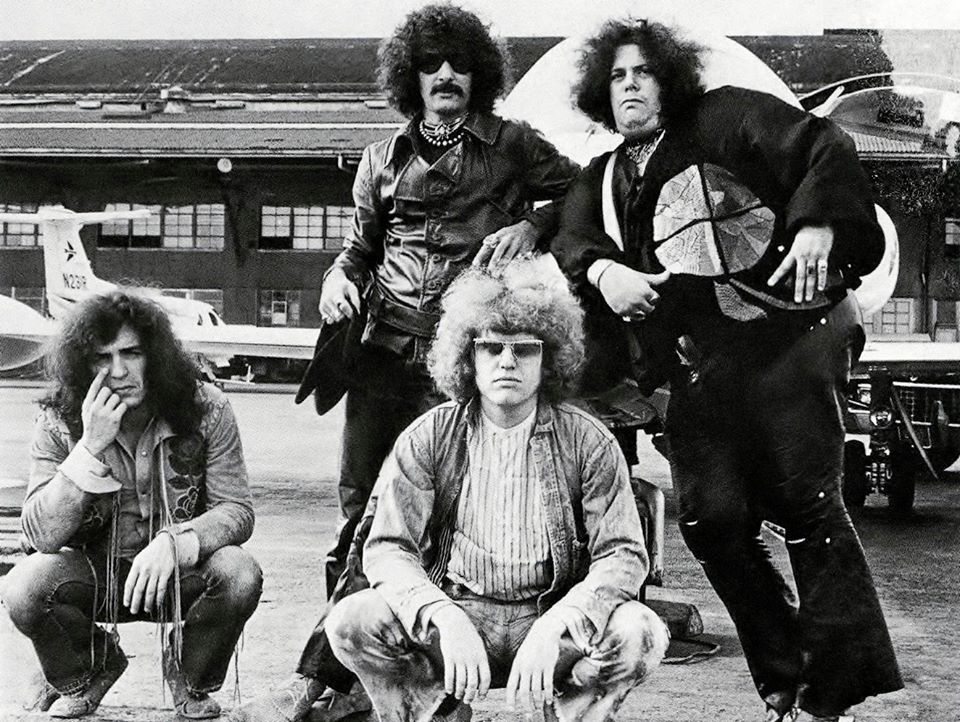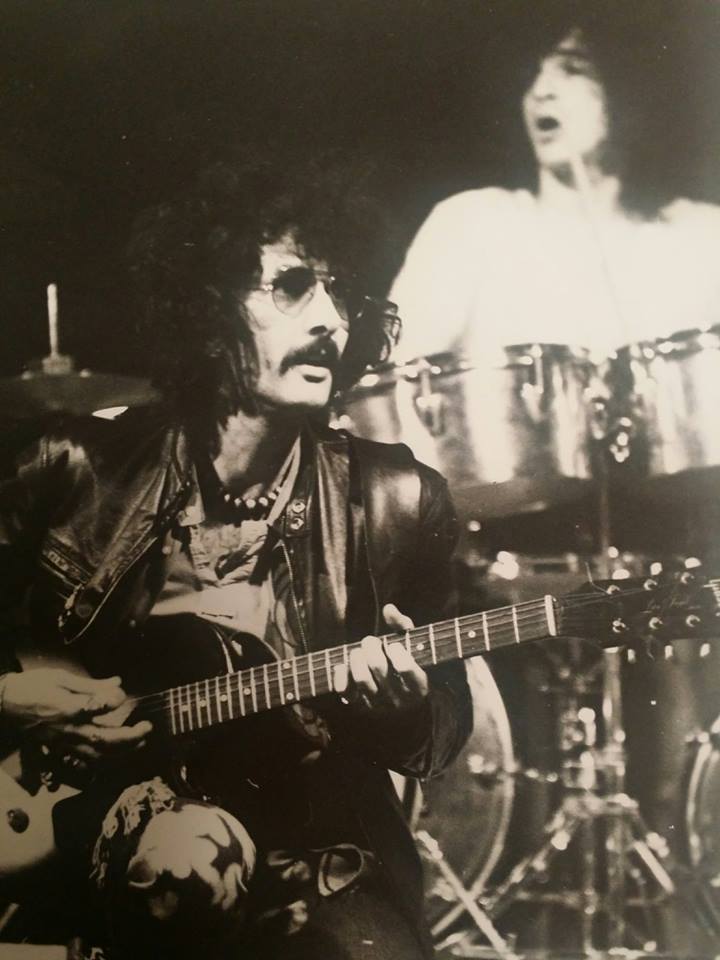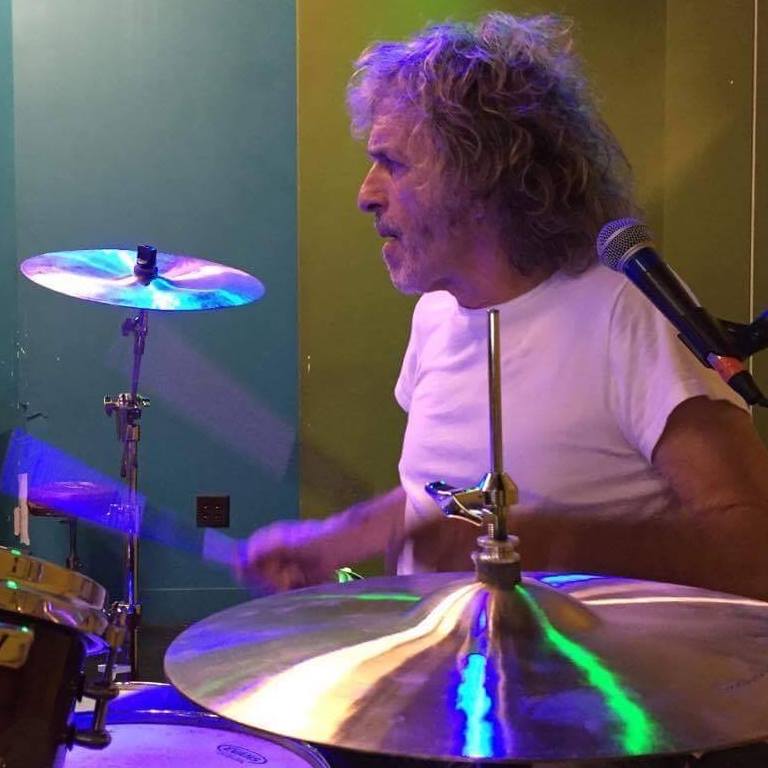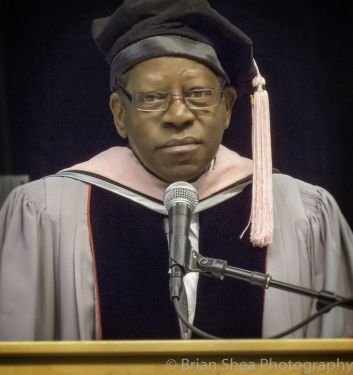The scene is 1976. Mountain's drummer Corky Laing get a call from Steve Wax, president of one of the most glorious record labels of that period, Elektra/Asylum. The content of the conversation between the top man of the record label and the drummer and singer/songwriter was about the general musical taste of the masses going through a generational change. Genres like Punk were beginning to surface in the rock landscape and got the full attention not just of the music industry but also of millions of music fans around the globe. Through a more confrontational and rebellious attitude expressed through the music and the lyrics, Punk was sonically taking over an era where Glam and Classic Rock had dominated the charts worldwide.
In a desperate attempt to regain the attention of those fans, which was migrating to more raw musical territories, Wax had asked Laing to form a Super Group in the aim to create a body of work of enormous quality that would win back the love and the affection of those devoted fans, now "distracted" by this new and tempestuous musical Nouvelle Vague.
Laing lost no time and gathered together the cream of the music industry, baptizing this massive project under the name Pompeii . Together with his Mountain's band mate bassist Felix Pappalardi, Guitarist Extraordinaire Mick Ronson and Mott The Hoople's singer/songwriter Ian Hunter, Pompeii started a two-years journey of writing and recording, gathering from time to time an incredible array of Special Guests, like Eric Clapton (Cream), Leslie West (Mountain), Dickey Betts (Allman Brothers), John Sebastian (The Lovin' Spoonful), Todd Rundgren and many more.
The results of those amazing sessions was never released and all the songs written by the Super Group never saw the light of the day for the last 40 years. This until 2018, when Rouge Records Store announced that, for Record Store Day, the material recorded between 1976 and 1978 by Laing and Co was going to be released in vinyl, with the album title being The Secret Sessions.
Bluebird Reviews was fortunate enough and honored enough to talk about The Secret Sessions release to the creative force of the Pompeii project, Corky Laing, about the making of this extraordinary record, certainly one of the most fascinating and exciting releases of 2018.

BBR - Hi Corky, thank you so much for talking to us at Bluebird Reviews and congratulations for having finally, the green light to release a monumental record like The Secret Sessions truly is. What were your immediate feeling when you knew that the album was finally going to see the light of the day?
CL - I was thrilled. It's a bit of a story, because the General Manager who runs a subsidiary company in Detroit, Rouge Records Store, which is a company that is, I believe, linked under the same umbrella of Third Man Records, (Jack White's label) opened a pressing plant over there and our record was one of the very first they were going too press on vinyl. One day I got a call from Jason Hartless, Managing Partner at Rouge Records Store, who is also Ted Nugent's drummer, a guy that I have been knowing for years. I was close friend with his father, lovely gentleman and from time to time, I was also giving drumming lessons to Jason. When he called me, Jason asked: "Corky, there's a song that you wrote that was on the initial CD that never really came out called Growing Old With Rock'n'Roll and I would like to record it". I said to him "No problem" and before we finished our conversation, Jason said to me "By the way, Corky, would you be up to, if I can manage to put the contractual paper together, to have The Secret Sessions album released on vinyl?" I was very excited when I heard that, just as I am now and it is kind of getting all things in full circle, in some ways, with me coming from a music era when there were 45 or 33 inches and to have this record released on vinyl, it's kind of ironic, especially if you think how much "In Vogue" vinyls are right now on the market. I like to think, in view of this, that I am a kind of Hip artist now and it is great to feel that way (smiles).
BBR - Pompeii, "The Super Group that never was". Given the extraordinary quality of the material recorded for this album, have you wondered what it might have been, for the band, to keep carrying on and working together, if only the record would have been allowed to be released in the late 70's?
CL - Yes, from time to time that has come to my mind. I guess that there is a sort of bitter-sweetness thinking about this project. As you know, Felix (Pappalardi, who died in 1983) is no longer with us and I am sure I would be still playing with him if he was still around. With Mick Ronson, it would have been the same too. I think it would have been quite a band, with two English musicians and two American ones bringing their sonic vibes from their respective backgrounds. Also, in terms of recording processes, technically speaking, at the time I met the English guys, I realized how seriously far ahead than us they were, in comparison to the United States. It would have been really cool to keep making music together with Ian, Felix and Mick. When I think about Mick, he really was the glue of the group. He was the Magic Man in the whole ensemble. Ian's writing and co-writing was super, Felix and I were able to put down a very solid rhythm track but Mick was the one that was able to come up with that sparkle, that magic sonic touch that would make things sound even smoother and better. If you are asking me whether I am sad, I would rather say that those memories are just kind of bittersweet to me, as I said before. You know, in the end, things just move along but I am very proud and happy about the fact that there is something about this record, in terms of posterity. What matters really is that we had those moments together as a band, they are on tape, we got that recorded and now they have been released too. I am glad you mentioned the quality of the sound of the album, because when we first went to the recording studio, in those days the record label was prepared to put a lot of money to develop some of these records and their productions. We had somebody like Bob Clearmountain, who was just starting his career at the time and looks where he is now, he is the Number One guy for sound! So, you see, we had all those people working with us and we had the budget. We had some great studios too. In fact, I finish some of the works at Carpricorn Studios in Georgia, the place where Eric Clapton came down to play the rhythm guitar with us. What a treat to feel the Clapton's vibe, with that part performed in a very crisp and clean style with some wonderful little nastiness on it. To be honest with you, there are some songs that I don't think they reached the bar that I wanted to reach, on the album, but the record label loved some of what I would call "Incidental songs". They wanted to re-record Growing Old With Rock And Roll and Jason was playing drums on that, so I said "Ok, see what happens with that". That song was written basically when I was 14-15 years old, you know, I was just playing around with the lyrics and I remember that at one time, I was speaking to Leslie (West) and I asked him what he thought about the song and he said (Corky imitating West's voice) "You can't have the word Old in rock and roll, people don't wanna know it's old". So I said "That is not what the song says" but Leslie didn't want to have any of that (laughs). You know, I think that everyone is entitled to their opinions but I am glad the song came out that way. So you see, to come back to what I was saying about the time we recorded the album, we had this organic feel going on and it just seemed to work so beautifully in so many aspects and I am so glad you enjoyed this record. It's such a great feeling that this music has finally come alive.
BBR - When the recording process was completed and given the fabulous quality of the Special Guests playing on The Secret Sessions, were you more surprised or amazed of the outcome, when you heard the final mix of the album?
CL - I was both. Actually, Jason Hartless at Rouge Records, he remastered and remixed few things on some of the tracks that certainly helped to embellish some of the sonic aspects of the record. For me personally, especially given the purity that comes from the sound of a vinyl, this is a record that grabs you by the balls. When I heard that some parts of the record were going to be remixed, I just said to the guys in Detroit "Don't make it sound brittle, don't use sound compression, because otherwise the music would lose a lot of its organic feeling". I think that they made a good job, on the record, I think they treated it properly, with respect. They wanted to maintain the original feeling as much as possible and, at the same time, to bring out the record's original dynamics.

Mountain in the early 70's - Photo By Internet Archive
BBR - Corky, is there a song or, perhaps, a part of the recording process that you remember more fondly than others, out of the whole period it took to write and record the album?
CL - Yeah, there are. We actually videotaped the sessions and that was one of the first times anything like that was done, long before the arrival of MTV. We had this guy called Sonny Fox, a well-known DJ from Philly that came down and asked me whether he could bring his camera and film us in studio while we were live recording, that was fun. One of my most favorite songs that Ian wrote was called The Outsider and I remember me asking Ian "How come that you and I are not going to record that song?". He said that he wasn't totally crazy about that song, with that western feeling about it but I said to him, "Listen, Ian, every musician feels like The Outsider and every musician feels like he is gonna die or hang somewhere in a desert". In the end, I managed to convince him to record it and that song became one of my favorites off the album. The thing for me, about that song, is that I can hear the drums taking over my vocals, while I am singing it. So I said to Ian, "Why don't you sing it?" and then he said "No, I can't do that I can hear that you are putting your heart and soul into it". When we recorded it, I thought I over-sang it and, confidentially speaking, when I look back at that song, I would have loved to have had a chance to re-do that song again one more time but I didn't. I guess that, in the end, it's what it is. You can try, go back and re-record everything all over again and I am sure that every musician reading this understands that. You always figure that you can do better but, at certain point, I guess you need to draw a line and say: "That's It, we have to move on" and that's what we did with the sessions at the Power Station studio. Another song that comes to mind is Silent Movie. That song just wrote by itself, if you know what I mean. I was going through a divorce and, you know, the lyrics were very subtle. We started off, everything was silent, you didn't have to say anything and then you get married! (chuckles). Listen, I am not dissing marriage, it's a wonderful institution but what I was saying on that song is that I was going through changes and the lyrics reflect that. They go back to the time when we fell in love in school, at the time where you, as a boy, you don't even know whether she is pretty but she just looks at you nice and you think "Wow, maybe I can even get a kiss out of her!". Of course we are talking about the perspective of a little boy of 5-6 years old. Yeah. some of the songs, like the one I mentioned, they developed very naturally and it certainly didn't hurt to have a great co-writer like Ian next to you at all. There was a certain energy, during the sessions, that was exchanged between musicians and everybody had the chance to do what they wanted to do. There was no rules, keeping in mind that there was never a band there playing but just a group of musicians doing what they loved to do without an ulterior motive, like going together on the road, that kind of stuff. We were there solely to record music together and, you know, some of the ideas that came out in the sessions ended up on one of Ian's albums later on, for which he thanked me a lot. For some time, Mick and I stayed in touch for a while because he was producing a Canadian band. So, overall, the freedom that we had was great and we had a lot of fun.
BBR - Have you been playing live often, with your own personal band, any of the songs included in The Secret Sessions or were you contractually obliged not to, by your old record label?
CL - Yes, I had total freedom on that. I have to say, the record company I was dealing with, called Elektra/Asylum, they were just wonderful with me. Every one, from the A&R people, the Press people, they were all so good to me. You could smell the vibes of the 60's and the 70's, at the time, with nobody's getting in anybody's way. Maybe in the present days it would have been a completely different ball game but back then, the record label was not confiscating the publishing and all that. It was a time and an era where there was people at record labels with a very cool attitude, granting the freedom to the artists to do what they wanted. I know that the whole of the music business has gone through a lot of changes, over the last 50 years and I know that well because I spent 7-8 years on the other side of the desk at Polygram. I was head of A&R at Polygram for Canada so I knew both sides pretty well, you know. What was happening at that time, is that I recognized that "Wow, I am becoming the f$$$ing weasel here, I am now in A&R!" (chuckles). I enjoyed the good parts of that time, surely enjoyed the pay-check coming every week and had all expenses paid wjile travelling around the world and this and that. But I felt that the industry was changing. I am sorry to say that, if there was anything wrong with the music business, it was all because of the greed. Money were flying around too easily, everybody was grabbing merchandise, publishing, they were grabbing performance money, it really was kind of ridiculous. The artists had a tough time trying to figure out what to do. If you had a great manager, you were in good shape but if you were trying to find your way and navigate your career, it was going to be tough. I don't envy any of the bands out there trying to navigate their careers right now, because it's like "What do you do first? Do you make a video? Do you write a good song or should we, as a band, have to work on our image first?". Look at the Americans, for example; when the American bands started to rock the world they didn't care about the way they looked. They were wearing flannel shirts and they did not really waste time about their image, because most of their records were breaking for radio. In the United Kingdom, as you may remember, already at that time you had big media vehicles like NME and Melody Maker, that were obviously showing photos of these bands, while in comparison, American bands were not looking as remotely as good as the English bands did, at that time. They had their hair right, they were posers, in some cases, but than you get a band like The Kinks, where they looked awesome, really great musicians and they came up with great material! I guess that, in the United Kingdom, it was a lot about the visual aspect of the musicians (although there were great exceptions like The Kinks, as I said and many more), while for the Americans it was all about the sonic aspect. Look at The Eagles. They never get dressed up, they wore the same flannel shirts for almost 20 years! I don't want to undermine anybody, though, I am just telling you the way it was, back in those days. It was kind of funny, because when we did get together for The Secret Sessions back then, Felix was working with Cream and quite a few more English artists and he was always dressing up, while we were in the studio (chuckles). I kept saying to him "Hey, Felix, you are in a studio, nobody's looking atcha and the way you dress!" (chuckles). He didn't give a s**t about it, he wanted just to look hot and sharp. Leslie West was in the same way. Leslie was a very large human being and he couldn't go to a retail store and just take something off the rack. He had all his clothes custom made and if you look at the pictures of Leslie in those days and perhaps even today, he is very vain, but he always looked great. I remember times when Leslie and I would go shopping like crazy. I remember once we went to a place in Cordoba, Spain, where they had the most beautiful leather outfits and Leslie and I would spend all our royalties on clothes. It was so much fun, those days, everyone wanted to wear leather or to look like an Indian, with all that turquoise stuff and all that.

Felix Pappalardi & Corky Laing - Photo From Internet Archive
BBR - Corky, among all the records close to your heart, together with this masterclass album that is The Secret Sessions, which is the other album that will stay forever with you for the rest of your life, an album that has got great significance for you?
CL - I would definitely go for Nantucket Sleighride (Mountain's 1971 album). Nantucket Sleighride encompasses a great deal of early influences for myself and for Felix for sure. Leslie was a huge Clapton fan but he also worked with Pete Townsend and on that record, you can certainly hear some The Who references. I was, of course, totally taken by The Who's Keith Moon, so much so that you can hear a shit load of drums on that record that I was just showing off. I am so very proud of all our performances, as musicians, on Nantucket Sleighride. I remember that, internationally, that album was received very well, that including also Europe and the United Kingdom. Yes, I would certainly say that Nantucket Sleighride would accomplish a lot of our influences, at that time. Then, what happens after that, for some musicians,is that when you have success, you tend to start copying yourself, that's the potential downside of this business. But, in our case, you couldn't certainly copy in any ways that purity, that rawness, that immediacy that was happening at that time, especially on a record like that. On certain records, I guess that as a musician, you just wanna make a point. On some other records, when together with making a point you wanna make a difference too, you get to a whole different level there. When you're going to make a difference, on a record, that's a lot of responsibility that comes with it and I think that, at the time, it was especially Felix that said "No, guys, we're gonna make a difference with this record". And I think he did.
Corky Laing will be touring Europe later this year. Details on Tour dates available on Corky Laing's Official Website


